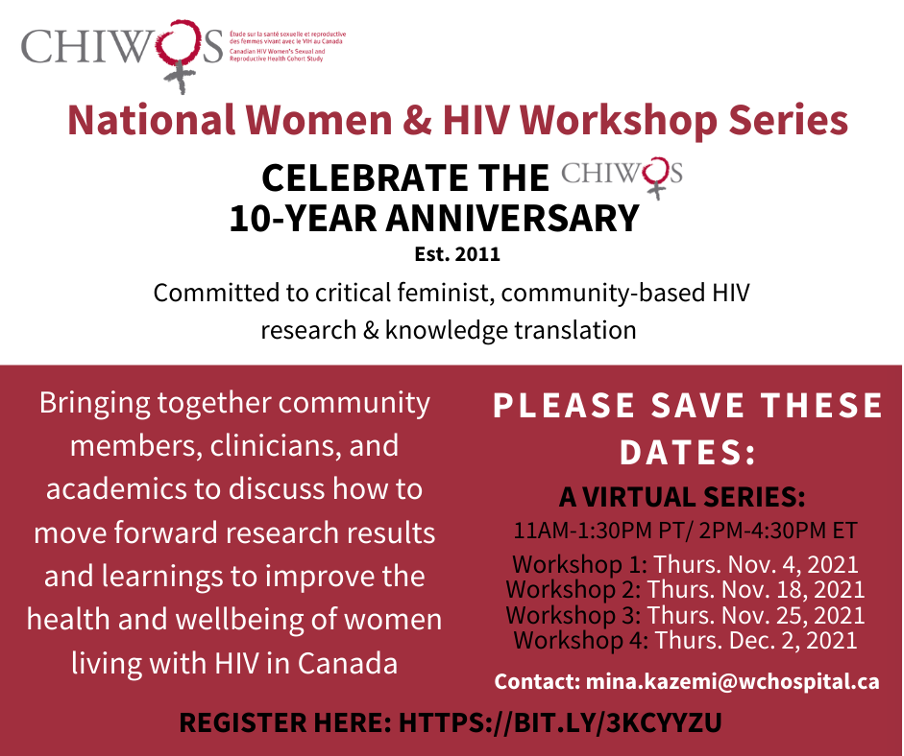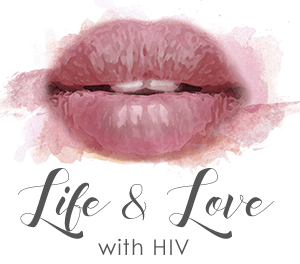
Courage
September 8, 2021
Fighting Depression
October 6, 2021
Courage
September 8, 2021
Fighting Depression
October 6, 2021Aging and Menopause - not the most interesting nor exciting topic overall was what I originally thought before researching this article. There is something innately uninviting to the subject at first glance. Aging just doesn’t have a simple positive spin, although I have learned to embrace it as a stand-alone concept. I like getting older, I like the prospect of grey hair and grandchildren. That aside, talking to both women living with HIV and not living with HIV, the conversation around menopause consistently in my post-menopausal experience ends up in a brief discussion about hot flashes, weight gain, and some chuckling comments around “at least no more periods.” In addition, the casual discussion rarely makes its way to impacts on our bodies and managing symptoms. It’s kind of shelved in that it happens to everyone in a kind of dismissive way, like, well I can’t do anything about it, and really who wants to talk about an aging dry vagina, or lack of sexual libido, restless sleep, mood swings and a very real reminder that we are aging and less desirable.
While menopause is a natural part of the aging process, very little research has been done about aging amongst women living with HIV, as well as on our experiences of menopause. Women have been historically under researched, underrepresented, and consistently put to the side when it comes to sexual health and the links between sexual health, function, risk and satisfaction. So, let's talk about more than just hot flashes, weight gain and periods, let's talk about what we know (or don’t know, as I didn’t until I researched further!) and try to unpack some of the science that has been done and celebrate that information.
"While menopause is a natural part of the aging process, very little research has been done about aging among women living with HIV, as well as on our experiences of menopause."
First off there are three stages to menopause: perimenopausal, menopausal, and post-menopausal. Menopause itself involves physical and psychological changes that can significantly impact a woman’s quality of life, and in turn her sexual desire, self-esteem and overall well-being. Menopause begins with the perimenopausal stage which involves irregular periods, vulva/vaginal changes, hormone imbalances and other impacts on the body. These changes can be treated and lead to a more balanced and confident understanding of aging with HIV, as well as the natural course of menopause. Rather than go into detail about Hormone Replacement Therapy (HRT) and/or topical oestrogen creams that treat and manage menopausal symptoms effectively, the more interesting science to me is the underlying connections and intersections of socio-economic, lifestyle and relationship issues that connect the dots as it were to a healthy outlook on aging, menopause and sexual health. My question is: How do we get our sexy back?
For me, my journey into menopause coincided around the same time I was diagnosed with HIV. I was diagnosed with HIV in 2008, I was 45 years old and had already been having irregular periods for a few years, but not consistently twelve months in a row, which is the clinical definition of menopause - having missed 12 consecutive periods in a row - 1 year. However, I also had an ovary removed due to a cyst in my mid-thirties, and my fallopian tubes were not in great shape, so they ended up doing a partial hysterectomy. It was a very sudden, painful wake up in the middle of the night, ending up in the ER within the hour and in surgery post haste situation. I had a cyst form in my fallopian tube which had burst in the middle of the night, and I ended up with a postoperative infection which then evolved to removing an ovary. I really don’t recall much of what was said or suggested during that time. I didn’t have a regular GP and there wasn’t really any follow up, except the painkillers and prescription from the hospital when I left. Suffice to say, I just went back to dancing (my full-time job at the time was in Modern dance), choreographing, working and being a single mom of two teenage daughters.
At the time I was sexually active, loved my partner at the time and was not concerned about reproductive health. I also was struggling with issues of sexual identity around bi-sexuality. I felt like I could fuck men, but I fell in love with women. It was confusing but I kept it to myself - it wasn’t something single moms talked about to their care providers I thought, and I was definitely leading a double life at times. It was also the nineties and HIV messaging was rampant with shame around sexual risk and behaviour. That didn’t help even though the stats weren't talking about women living with HIV, I swallowed the MSM (men who have sex with men) messaging as if it applied to me as well, even though I was HIV negative! So my identity, and education around sex overall was pretty screwed up.
"It was also the nineties and HIV messaging was rampant with shame around sexual risk and behaviour."
Fast forward to my HIV diagnosis in 2008. By this time my daughters were grown up, I was trying to dismiss my feelings for women and ended up in short term relationships with men that were looking for a brief fling, a sex buddy, with no strings attached. And as my periods were erratic, many months, no strings were attached. Tampon pun intended. I could handle these relationships emotionally because they never went anywhere serious, I didn’t have to deal with my conflicting emotions because the relationship never got to a conflicted stage, until one did, and then I tested positive for HIV. However, that’s not the story for this blog, that one is already written, danced and been told on this website and in various presentations over the years.
So, where does this lead me in terms of menopause, women living with HIV and research? First off, a realization of how intertwined our relationships, socio- economic, social supports and communication with our care providers are. This is not simply a matter of accepting “the change” as my mother referred to it as, it is a complex association of variable factors that include all of the above and more importantly a growing field of research that is asking questions that impact both women living with HIV and those not living with HIV.
"...a realization of how intertwined our relationships, socio- economic, social supports and communication with our care providers are."
Treatments for perimenopausal symptoms, HTP - Hormone Treatment therapy and topical oestrogen creams are available to both poz and non poz women, however, the factors impacting women living with HIV are heightened and exacerbated by physiological factors, including bone health, food security, diet, exercise, substance use, and the layers of psychological impacts they have on aging and living with HIV. With research in this field relatively new, and conclusions not yet definitive, the need for further research is unquestionably needed.
Below is a list of some of the most current research done and in my opinion, reflects the excellence of researchers in this growing field of inquiry. I highly recommend clicking on a link below and reading some of it with questions you have for yourself - there is so much information to be heard and learned from. I am not a scientist, but I can read research better with practice, so, I continue to do so.
Recently, I find myself immersed in aging and women living with HIV as a Peer Research Associate for a study in Canada called ‘BCC3’ - where the overarching goal is to better understand healthy aging, by, with and for, women living with HIV from cell-to-society, www.hivhearme.ca Additionally, this includes further research and investigation into the effects of menopause on women living with HIV and the role it plays in sexual health and aging. This is new, emerging research and promising in it’s investigation by the women leading the research as principal investigators, the peer researchers administering surveys with peer driven policies. We are getting some attention finally in areas that truly matter to the overall health and wellbeing of women living with HIV.
"With research in this field relatively new, and conclusions not yet definitive, the need for further research is unquestionably needed."
In November, here in Canada, there will be a four week virtual symposium on HIV and Aging, which promises to look into a variety of factors affecting persons living with HIV and aging and, an additional series entitled “Menopause; Untold stories around the moon table”, with one of our collaborators on the BCC3 team, Dr. Elizabeth King presenting “Embracing sexuality; before, during and after menopause”, Nov. 10th @ 4pm. PST. Please see details for information and registration below. If you’re interested, I have also included a bunch of links to articles recommended to me below that I found particularly interesting on these topics. It’s not all as dry as you might think! I learned a ton this weekend during a particularly stormy rain filled weekend, my favourite time to read and write!

I know that without this platform, for me one of the most empowering pieces in women living with HIV research with creative knowledge translation, is this website, www.lifeandlovewithhiv.ca , dedicated as we know to de-stigmatizing sexuality and relationships among women, partners and couples living with HIV by shifting the focus from risk to pleasure. I would probably not have found the inkling or desire to ask a question like “How do we get our sexy back?” For me, many of my answers are in the blogs on this website and the ground-breaking research being done on healthy aging for women living with HIV. Enjoy the reading if you are so inclined and maybe we will virtually see each other on one of the upcoming virtual series. Until then, I’m working on getting my sexy back and who knows what that may look like when I do, or if I do, but, I’m open to it, that’s for damn sure.
"Until then, I'm working on getting my sexy back and who knows what that may look like when I do, or if I do, but, I'm open to it, that's for damn sure."
Recommended resources for further reading:
- Menopausal women living with HIV need better information on how to manage symptoms: https://www.aidsmap.com/news/sep-2021/menopausal-women-living-hiv-need-better-information-how-manage-symptoms
- Love with HIV: A Latent Class Analysis of Sexual and Intimate Relationship Experiences Among Women Living with HIV in Canada: https://link.springer.com/article/10.1007/s10508-019-1418-5
- Sexual inactivity and sexual satisfaction among women living with HIV in Canada in the context of growing social, legal and public health surveillance: https://pubmed.ncbi.nlm.nih.gov/26643457/
- “The Pleasure Is Better as I’ve Gotten Older”: Sexual Health, Sexuality, and Sexual Risk Behaviours Among Older Women Living With HIV”- Archives of Sexual Behaviour: https://link.springer.com/article/10.1007%2Fs10508-016-0751-1
- Healthy Aging in Older Women Living with HIV: a Systematic Review of Psychosocial Factors: https://link.springer.com/content/pdf/10.1007/s11904-017-0347-y.pdf
- Sexuality and Intimacy Among Older Women Living with HIV: a Systematic Review: https://link.springer.com/article/10.1007/s11930-019-00227-6
- Ageing and healthy sexuality among women living with HIV: https://www.tandfonline.com/doi/full/10.1016/j.rhm.2016.11.001
- Sexual Health Behaviour and Mental Health Among Older African American Women: The Sistahs, Sexuality, and Mental Health Well-being Project: https://www.liebertpub.com/doi/full/10.1089/jwh.2017.6777?casa_token=IONZg2EnUx8AAAAA%3AyQyrxc6qbqCXdGkSDHqoidEasGHuWWqYud346ZKGd4ltX-35yoS0Sb0Gyt-unclkbOoQQrakAPie
- The intimate lives of older adults living with HIV: a qualitative study of the challenges associated with the intersection of HIV and ageing: https://www.cambridge.org/core/journals/ageing-and-society/article/abs/intimate-lives-of-older-adults-living-with-hiv-a-qualitative-study-of-the-challenges-associated-with-the-intersection-of-hiv-and-ageing/0DF3040693C0F7E513A2193DC0071589
- Association of HIV status with sexual function in women aged 45- 60 in England: results from two national surveys: https://www.tandfonline.com/doi/full/10.1080/09540121.2019.1653436






